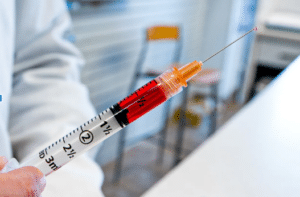What is Peripheral Neuropathy?
Peripheral neuropathy is nerve damage caused by a variety of conditions, such as trauma, infections, metabolic issues, Diabetes, genetic reasons, and exposure to toxins. It develops when the peripheral nerves, which are located outside of the brain and spinal cord, are damaged. Weakness, numbness, and stabbing pain are common symptoms. Often, symptoms get better, especially if they’re brought on by an illness that can be treated. It affects the hands and feet and can have an impact on many bodily processes. Pain can be managed with medication.
What is Vitamin B-12?
Vitamin B-12 (cobalamin) is essential for the creation of DNA, the molecules inside cells that carry genetic information, and the metabolism of cells.
Poultry, meat, fish, and dairy products are food sources of vitamin B-12. Additionally, some foods—like morning cereals—are fortified with vitamin B-12, and it is also available as an oral supplement. Vitamin B-12 Insufficiency can lead to anemia, fatigue, muscle weakness, digestive issues, nerve damage, and mood swings. However, it may be treated with injections or nasal sprays of the vitamin.
When Would I Need a B-12 Injection for Neuropathy?
1. Vitamin B12 Deficiency
Since your body reserves some vitamin B12, a deficit may not manifest for several years. Following a vegan or vegetarian diet, having gastrointestinal issues, having pernicious anemia, and taking specific drugs are issues that frequently result in a deficiency.
Unfortunately, chances are that vitamin B12 deficiency has already harmed your nerves by the time you experience symptoms.
2. Peripheral Neuropathy Caused by a B12 Deficiency
All of your nerves that are not inside your brain or spinal cord are considered peripheral nerves. Peripheral neuropathy is a condition caused by injury to one or more of these nerves.
The myelin sheath, a protective tissue that surrounds each nerve and guarantees that electrical impulses pass at the right pace, is harmed by a lack of vitamin B12. Your nerves are unable to function normally when the sheath is compromised.
3. Nerve Damage Due to Other Causes
Injections of vitamin B12 aid in the repair of peripheral neuropathy brought on by conditions other than a B12 shortage.
How Do B-12 Injections Help Treat Peripheral Neuropathy?

Regular B12 injections help treat peripheral neuropathy brought on by the range of illnesses we covered above because the vitamin is crucial for maintaining healthy nerve function.They are more readily absorbed than oral doses and can promote myelin sheath regeneration and safeguard the nerves.
It has been discovered that this type of treatment is especially helpful for easing the pain and symptoms of diabetic nerve damage. The medications provided to manage blood sugar levels can also lead to B-12 deficiency, in addition to excessive blood sugar levels harming nerves. B-12 injections protect the nerves while also addressing any vitamin deficiencies that might be resulting in additional harm. This is especially important if you are prone to developing peripheral neuropathy.
What is Methylcobalamin?
A lack of vitamin B12 is treated with methylcobalamin. The brain, nerves, and red blood cell formation all benefit from vitamin B12. People with pernicious anemia, diabetes, and other diseases may occasionally utilize methylcobalamin.
What Are the Benefits of Getting a B-12 Injection?
1. Prevents Certain Diseases
Vitamin B12 is essential for the immune system, as it ensures that red blood cell synthesis receives the oxygen it needs to maintain healthy immunity. In order to maintain the immune system, it is crucial to consume adequate B12 and be aware of the symptoms of a deficit.
2. Vitamin B12 Enhances Healthy Cells in Nails, Hair, and Skin
Vitamin B12 is essential for healthy cell formation, and a deficiency can lead to a variety of dermatological problems like hyperpigmentation, nail discoloration, and irritated and cracked corners of your mouth. Maintaining adequate vitamin B12 levels in your body will keep your skin, hair, and nails healthy. Increasing vitamin B12 levels can also help and relieve dermatologic symptoms, improving attitude and self-esteem.
3. Vitamin B12 Enhances Good Mood and Helps Fight Depression
Vitamin B12 is essential for the function of the brain, mood, and serotonin synthesis. Low serotonin levels can lead to depression, so getting enough vitamin B12 can improve mood and possibly minimize depressive symptoms. Antidepressants are more effective when taken with additional vitamin B12.
4. B12 Shot Enhances Your Sleep
Studies have connected B12 to melatonin synthesis. The hormone that naturally induces sleep, melatonin, aids in regulating your body’s internal clock. B12 injections may be a natural solution if you’re having difficulties sleeping and staying asleep.
5. Vitamin B12 Renews Your Energy
Vitamin B12 is essential for metabolism, which can be accelerated and made to work more efficiently with a balanced B12 level. While all of the B vitamins are necessary for the generation of energy, vitamin B12 is particularly crucial. Insufficiency can lead to fatigue and weight gain, and an injection of vitamin B12 can increase energy and help with gastrointestinal issues.
6. B12 Injections are a Beneficial Therapy for Chronic Hemodialysis Patients
Patients with low levels of B12 who receive this vitamin via injection report an improvement in their quality of life. Epogen, a synthetic substance that aids in the production of blood cells by the body, is used to cure anemia in hemodialysis patients. Researchers believe that if you have low blood levels of vitamin B12 and they administer the vitamin during dialysis, your need for epogen will be reduced and your ability to generate blood cells will be improved.
What Do Chronic Hemodialysis Patients Suffer From?
Most people who need hemodialysis suffer from a range of medical conditions. Many people’s lives are extended with hemodialysis, however those who require it still have shorter life expectancies than the general population.
You can manage these problems with the aid of your dialysis team:
- Low blood pressure (Hypotension).
- Muscle cramps.
- Itching.
- Sleep problems. People who receive hemodialysis frequently struggle to fall asleep, sometimes as a result of breathing pauses while they sleep (sleep apnea), or as a result of achy, unpleasant, or restless legs.
- Anemia. Anemia, a condition in which the blood does not contain enough red blood cells, is frequently brought on by renal failure and hemodialysis. The hormone erythropoietin, which promotes the development of red blood cells, is produced less when the kidneys are failing. Anemia can also be caused by a restricted diet, poor iron absorption, repeated blood testing, or the hemodialysis removal of iron and vitamins.
- Bone diseases. Your bones may deteriorate if your damaged kidneys are unable to metabolize vitamin D, which aids in calcium absorption. A frequent side effect of renal failure, parathyroid hormone overproduction, can also cause the release of calcium from your bones. Because too much or too little calcium is removed during hemodialysis, these diseases could become worse.
- High blood pressure (Hypertension).
- Fluid overload. Drinking more fluids than is advised between hemodialysis sessions might result in life-threatening consequences including heart failure or fluid buildup in your lungs (pulmonary edema), as fluid is removed from your body during hemodialysis.
- Inflammation of the membrane surrounding the heart (pericarditis). The membrane that surrounds your heart may become inflamed as a result of insufficient hemodialysis, which may hinder your heart’s capacity to pump blood to the rest of your body.
- High potassium levels (hyperkalemia) or low potassium levels (hypokalemia). Extra potassium is eliminated via hemodialysis; your kidneys ordinarily remove this element from your body. Your heart may beat erratically or stop if dialysis removes too much or too little potassium.
- Access site complications. The effectiveness of your hemodialysis can be affected by potentially harmful consequences like infection, constriction or ballooning of the blood vessel wall (aneurysm), or blockage. Follow the advice of your dialysis team on how to monitor changes in your access site that can point to a problem.
- Amyloidosis. Amyloidosis associated with dialysis occurs when blood proteins are deposited on joints and tendons, resulting in discomfort, stiffness, and fluid buildup in the joints. People who have undergone hemodialysis for a prolonged period of time are more likely to develop the disorder.
- Depression. Mood swings are frequent among renal failing patients. If you feel depression or anxiety after beginning hemodialysis, discuss therapy options with your medical team.
Do B-12 Injections Actually Help Stop Damage to Your Peripheral Nerves Before Peripheral Neuropathy Occurs?
There are numerous drugs that can treat peripheral nervous system issues. These can take a variety of forms, including injections, oral pills, skin-attached patches, slow-release drugs, and more.
Depending on the origin of peripheral neuropathy, there are many different possible treatments. Your medical history, preferences, and more can all have an impact on how you are treated. The best person to answer your questions about the recommended treatment(s) and anticipated recovery time is your healthcare professional.
Conclusion
Peripheral neuropathy is a nerve damage caused by a variety of conditions, such as trauma, infections, metabolic issues, Diabetes, genetic reasons, and exposure to toxins. There are various drugs available to treat peripheral nervous system issues, such as injections, oral pills, skin-attached patches, and slow-release drugs. Regular B12 injections are a common treatment for peripheral neuropathy caused by a range of illnesses. They are more advantageous than oral doses as they are more easily absorbed by the body and can help protect the nerves. Vitamin B-12 is essential for the creation of DNA and the metabolism of cells, and deficiencies in these can lead to anemia, fatigue, muscle weakness, digestive issues, nerve damage, and mood swings. There are many different possible treatments for peripheral neuropathy depending on the origin, your medical history, preferences, and more. A visit to a healthcare professional is the best course of action in cases like these.


